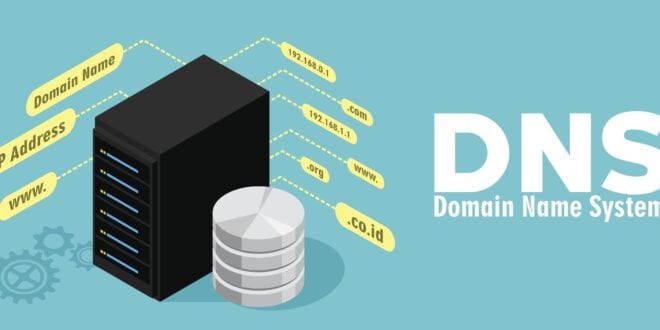Surely it has happened to everyone at least once that the internet is blocked or completely lost for a while. In such moments you can see a notification that says something is wrong with the DNS server. For those who know what a DNS server is, this is no problem, but those less familiar with the term might find themselves in a vicious circle.
What is a DNS server?

DNS (Domain Name System) is one of the basic components of the Internet, which is a system that converts computer names (hostnames) into IP addresses. DNS also provides data about domain e-mail servers (MX), home DNS server (SOA), and more. Namely, it is a distributed hierarchical composition of the Internet server which contains information related to domain names. It can be said that a DNS server is a single database in which all the names and IP addresses of individual computers are written, as well as groups of functions that enable their translation. The role of DNS is to obtain IP addresses from symbolic names that are much easier to remember, e.g. in the browser, we enter the address “www.hostingcentar.com” instead of the numbers 213.147.103.230.
Additionally, DNS ensures that a single IP address (currently used IPv4 protocol on the Internet has a limited number of different IP addresses that are less and less free as the number of smartphones increases) can have multiple domains and pages (max 65535 at one IP address).
Now that we know what a DNS server is, we can have fun with the following term.
What is DNS failover?

It’s about redirecting a query to a domain name that belongs to you or a page with a different address. In this way, by entering the domain name, users are redirected to the website specified in the settings, thus saving time.
What is the purpose of redirecting a DNS domain? Let’s say you have a particular site that has been behaving very well for quite some time. There are many different sections in this place. It is one part of the products that suppliers supply. The product needs to be promoted somehow and in a very successful way. You must purchase a targeted domain name. Then enable the forwarding service to the address of the service provider’s section on your site. This way, visitors will be able to enter the address of the supplier’s product, which will be direct. You can use this direct address, to advertise the brand … The address should be easy and easy to remember. In that case, potential buyers will not bother much to remember the address. Advertising will be more effective. DNS redirect domain – is a very convenient and easy way to promote various product groups, it makes it easier, faster, and more successful. If you still doubt that DNS domain redirection can be successful, then stop doing so. This method has repeatedly confirmed its success in promoting brands in practice. Moreover, this method will not take you much time. You also don’t need to resort to the help of many experts. And it can save you money. Learn more about it on https://constellix.com/.
DNS security

Unfortunately, there are various security issues associated with the DNS system. There are a series of tricks that can force the destination DNS server to accept false records. Such a method of forging DNS records (DNS forgery) unconscious customers are redirected to fake addresses and thus become an easy target attacker. By default, such attacks are in the form of a DNS poisoning buffer (cache poisoning), an attack that affects the DNS server to believe that he has received authoritative information about some RRs. This affects all clients that use the respective DNS server. Yes, they also use falsified information, which can allow for a further variety of attacks on client computers. There are three basic types of such an attack:
- Server redirection for the destination domain – where for one the domain on the malicious server specifies its own NS (Name System) for the requested one domain in the authoritative section and the additional section gives its own, and a record with a fake NS that is nominally in the attacked domain. The poisoned server remembers the IP address of the NS server that is now the attacker’s DNS server and thus the attacker gets the opportunity to arbitrary handling of the entire attacked zone.
- Redirect NS records of the destination domain – allows redirecting the DNS server of another domain (unrelated to original query) to any attacker’s IP address. Attacker’s DNS the server responds in the authoritative section for the attacked domain (unrelated to the original query) with NS record in the requested domain, and in the additional answer gives a record with the IP address of the respective DNS server. This leads to the same functionality as in the past attack.
- The third type of attack is an identification attack – where the basic idea is predicting a 16-bit identification number in DNS communication. If the attacker successfully hits the same and is the first to return a response with the correct number, the server/client will treat its response as correct and authoritative. Unfortunately, with as many concurrent as possible DNS queries processed by the server, the probability of a successful guess (i.e. the probability of collision) of a unique number of queries increases. Today, modern software generally solves this problem with better quality pseudo-random generators as well as a random selection of high source ports for queries (since the response must be sent to the same source port).
Why buy DNS hosting?

Availability and performance
Avoid situations where your portal loads slowly, or a “Site not found” error appears. These cases generally mean that your DNS server is slow and does not show you the correct content.
- Redundancy
Your DNS zone is located on multiple DNS servers.
- Security
By using an unreliable DNS service, ie one that is not adequately protected, when “surfing” you can be redirected to a Web site with malicious content that can seriously harm your computer and compromise your information. Misuse of your personal information can cause you serious legal and material damage. QSS DNS hosting service uses professional server protection. This protects you from incorrect DNS responses that can redirect you to malicious Web sites.
- Simplicity
Web-based administrative interface.
- Records
Add unlimited A, AAAA, CNAME, MX, SRV, or TXT records to your domain.
 Imagup General Magazine 2024
Imagup General Magazine 2024



